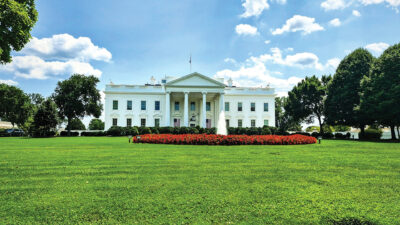U.S. To Lower Duties On Canadian Lumber
In published reports, the U.S. Department of Commerce has indicated in its latest review on Canadian Softwood lumber shipments, it will reduce tariffs for most Canadian producers.
The department announced the combined countervailing and anti-dumping duties for most lumber companies will be reduced from 17.99 percent to 11.64 percent.
The rate changes will take place following the U.S. department’s issuing of final results, expected in June.
Chuck Fowke, chairman of the National Association of Home Builders (NAHB) issued the following statement: “NAHB welcomes the Biden Administration’s move to reduce duties from 17.99 percent to 11.64 percent on Softwood lumber shipments from Canada into the U.S. Reducing these tariffs is an important step forward to addressing America’s growing housing affordability crisis and easing extreme price swings in the lumber market that have added more than $18,600 to the price of a new home since late summer.”
USDA Announces Plan To Fight Wildfires
U.S. Dept. of Agriculture (USDA) Secretary Tom Vilsack and U.S. Forest Service Chief Randy Moore recently launched a comprehensive response to the nation’s growing wildfire crisis. The strategy outlines the need to significantly increase fuels and forest health treatments to address the escalating crisis of wildfire danger that threatens millions of acres and numerous communities across the United States.
The strategy calls for the Forest Service to treat up to an additional 20 million acres on national forests and grasslands and support treatment of up to an additional 30 million acres of other federal, state, Tribal, private and family lands. Fuels and forest health treatments, including the use of prescribed fire and thinning to reduce hazardous fuels, will be complemented by investments in fire-adapted communities and work to address post-fire risks, recovery and reforestation. These treatments will be strategically focused and at the scale of the problem, based on best available science.
The Bipartisan Infrastructure Law provides nearly $3 billion to reduce hazardous fuels and restore America’s forests and grasslands, along with investments in fire-adapted communities and post fire reforestation, according to a statement released by the USDA.
Biden Administration Issues Business Advisory On Doing Business In Myanmar
The Office of the U.S. Trade Representatives and the Departments of State, Commerce, Labor, Treasury, and Homeland Security released a new Business Advisory recently entitled “Risks and Considerations for Businesses and Individuals with Exposure to Entities Responsible for Undermining Democratic Processes, Facilitating Corruption, and Committing Human Rights Abuses in Burma (Myanmar).”
The advisory warns, as reported by the International Wood Products Association, “Businesses and individuals with potential exposure to, or involvement in operations or supply chains tied to the military regime that do not conduct appropriate due diligence run the risk of engaging in conduct that may expose them to significant reputational, financial, and legal risks, including violations of U.S. anti-money laundering laws and sanctions.”
The business advisory highlights concerns for businesses operating in or connected to Myanmar, including state owned enterprises (“SOEs”) benefitting the military, such as the Myanma Timber Enterprise (MTE). SOEs play a dominant role in the oil and gas, mining, postal, energy, and transportation and logistics sectors and are responsible for generating about half of the military regime revenue and spending, and half of the regime budget. In addition to supporting the military regime, the advisory warns many SOEs are subject to allegations of corruption, child and forced labor, surveillance, and other human and labor rights abuses. Military regime leadership as well as several SOEs are subject to OFAC (Office of Foreign Assets Control) sanctions under Executive Order (“E.O.”) 14014 – Blocking Property With Respect to the Situation in Burma that was issued on February 10, 2021 in response to the military coup. Businesses and individuals involved in dealings with SOEs in Myanmar should conduct appropriate due diligence to ensure they are not furthering corruption within Burma, supporting child or forced labor, or contributing to arbitrary or unlawful surveillance practices, or any other serious human rights abuses.
Administration Launches Coalition Of States And Local Governments To Strengthen Building Performance Standards
President Joe Biden recently announced that his administration is partnering with 33 states, cities, labor, and industry to launch the Building Performance Standards Coalition, the first-ever collaboration to supply cleaner, healthier, and more affordable buildings. The announcement builds on the U.S. Department of Energy’s (DoE) projects to upgrade 1 million homes, and the push to retrofit 4 million buildings and 2 million homes in Biden’s first term. Participation includes devising policy roadmaps, organizing place-based teams to co-create policy, identifying and taking action on prerequisites for building performance standards and complementary policies, and sharing outcomes and experiences to cultivate a community of practice whose end goal is advancing legislation or regulation in each represented jurisdiction by Earth Day 2024.
DoE and the Environmental Protection Agency (EPA) also announced actions to accelerate building performance standards and policy innovation nationwide, which will help jurisdictions through analysis support policy design, and implementation tools. DoE’s Building Technology Office will back analyses of existing building stocks and cooperate with local governments to establish emissions reduction goals using enhanced data collection tools. DoE will also share best practices for state and local governments that are embracing building performance standards, including public- and private-sector financing, plus analytical support to review how policies targeting emissions reductions in existing buildings can lead to minimum new construction building energy codes. Meanwhile, EPA will uphold policy development and implementation through analysis and recommendations of metrics and best practice toolkits; deliver insight into current building energy consumption data as the basis of jurisdiction-specific analysis and target setting; and augment the ENERGY STAR Portfolio Manager to provide new policy tracking and reporting capability.









